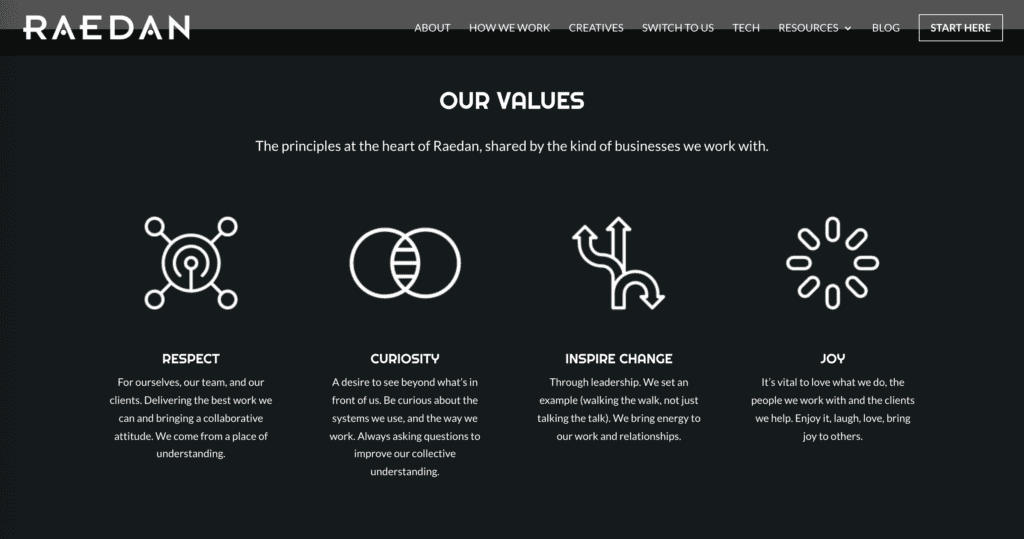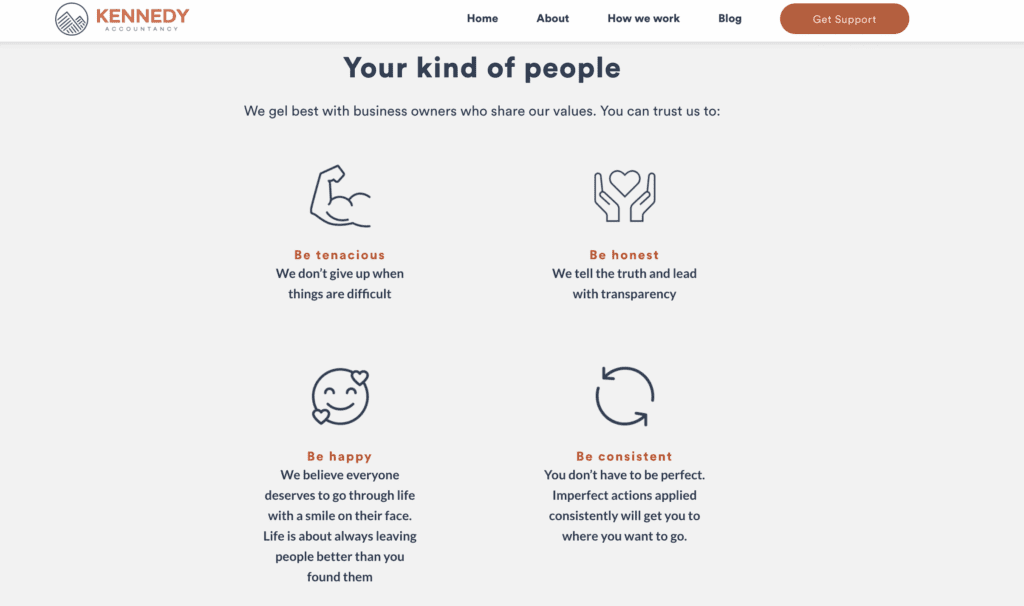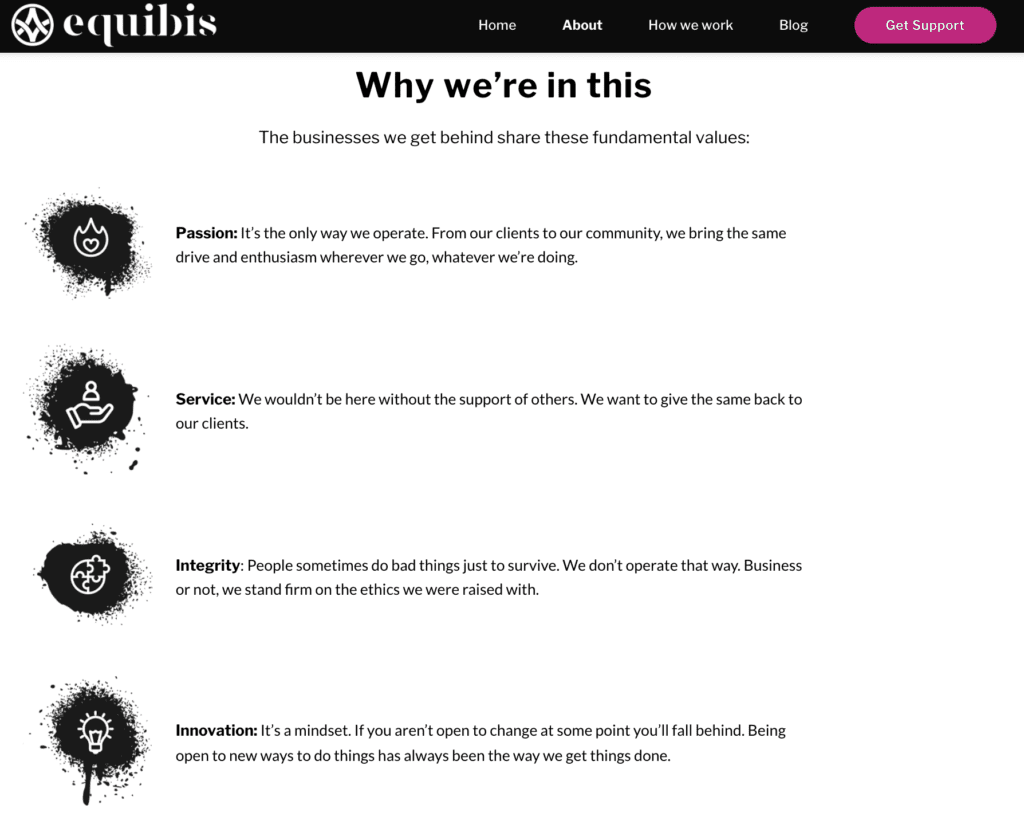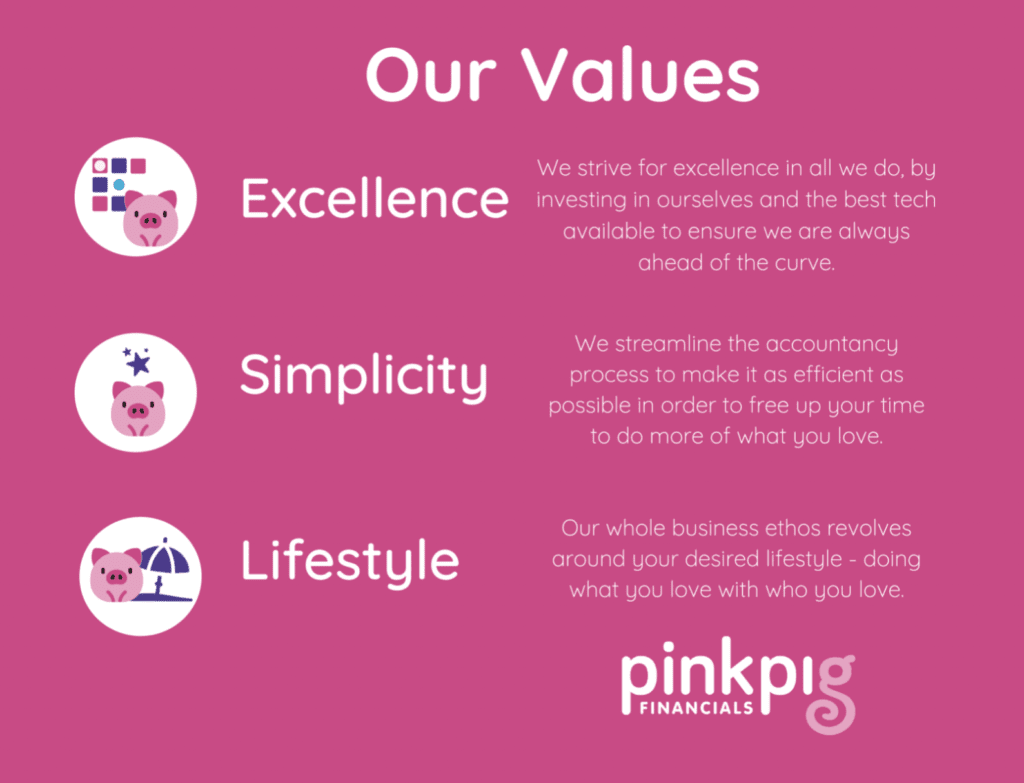Knowing what your firm’s values are, and applying and living them out, is so important for your company culture. These are what help you be successful and strong: and once you have them, you have to live by them throughout your firm’s journey.
Your values are your guide for every decision you’ll make for your firm: When you hire someone new you are also evaluating them based on your company values and thinking how their own values would fit yours as a firm. Your brand, your website, your team, your clients… everything is based on your firm values.
This means your team must be part of your values definition or documentation.
Imagine values as the limits of the road when you drive. They sit at the heart of your foundations, they speak who you are as a firm and what you stand for. Therefore, they reduce the time you spend making decisions about a prospect client, about a new hire and about what’s best for your firm, because everything that is outside those values would harm you or send you in the wrong direction. This is why the right values for your firm are more than words, they are things you live and work by every single day.
You can read more about the importance of values to your firm in these two articles: ‘Choosing personal pillars and values (and how this helps a team)’ and ‘Values: have them and live them’.
In PF, we have 6 values (or behaviours for the work we do). One of them is “Show transparency”, and we work to truly live this value by being real about what we share and what it means for us (and for the company). For example, if one of the team sees something in a design for a client, we don’t hold back because someone’s feelings might be hurt, or because the whole design may need to start over. Transparency means sharing the right things at the right time, to preserve and protect relationships (with each other and with clients). It doesn’t stand alone, though: each value is influenced by the other values. So for example when sharing feedback or observations, transparency doesn’t mean saying “this won’t work”: it means explaining what we see and why it matters so much, and it means sharing perspective with graciousness.
“Be gracious” is another PF value. We always look for better words to speak our minds with other team members and with our clients. If we think there’s something wrong or misunderstood with a client we would always try to communicate with them right away and get to a solution by collaborating with them.
“Collaboration” is another PF value which can also be applied internally when we see that one of our colleagues is going through something and can be needing an extra hand. In my case, the team always helps me improve my English, and that’s a beautiful thing.
Why is it important to involve my team in our firm values? Can I do it myself?
Within an accountancy firm, values are part of the foundations. Your team behaviours, attitudes, motivations and expectations must be based on them because they are the backbone of your firm. Naturally, your values flow from you personally and from the way you want to run your firm (or the way the whole board does). They also apply to your team.
Making your team part of this process shows you value them and you care about how they feel about it. They will also have a better understanding of what your firm values actually mean.
It’s important that your team knows your values well and helps you embrace them, promote them and share them whenever possible. For that to happen they need to be part of the process. They may be involved in a big way or a smaller way; but they absolutely must be part of it.
Here are some important reasons why your team must be involved:
- Your team will feel involved in the future and purpose of the firm when they see their input is valued in this type of session, and in your brand.
- They are the ones living out and feeling the values, and expressing them to clients. They need to know you trust them to be a part of the decision process and their input is worth listening to.
- Your team works with clients on a daily basis so they’ll recognise what matters most to the type of people you most want to work with. This experience and knowledge will contribute to what you decide your firm’s values to be.
- Ideally, you would only hire people who fit the values of your firm: so your team will know what your current values are and will live them into them. (If there are people on your team who don’t know or live out those values, now is the time to address that.)
- It’s your responsibility to educate your team: they’ll want to know 1. Why do values matter so much? 2. How do they impact your firm? 3. How do they use them as a guide to make decisions for your firm? 4. How do they use them as a guide when working with clients? 5. How will your team know how to use your values in their interactions and conversations with each other? You need to give them the confidence and understanding to live those values in different scenarios.
You need to come to an agreement on what the words mean to you and them as a firm. If you choose values and then tell them what they are, with no discussion or listening or input, they haven’t been part of the process. They don’t know where they’ve come from and the story behind them. Depending on the size of your firm, their involvement will vary: but the involvement must be there.
How do I run a values session with the team?
- Prep your team properly – explain why you’re doing the session and what you as a team want to get out of it. Knowing the purpose of it will help to get the most out of it. (To do this, read on!)
- Set expectations – explain to them what’s going to happen and how. Together you’re going to either work through the values you already have, or define new ones.
- Set prep work – to help your team get into the mindset, set them some homework before the session. One idea is to ask them to come to the session with at least 10 words or short phrases that they feel identify your firm and them as employees. Things which they want to live out themselves, and believe everyone at the firm (including clients) must live out too.
- Keep the conversation going before (and after) the session – how are they feeling about it? Do they understand why you’re running it? Do they need any help or support before the session to make sure they get the most out of it?
- Think about time/location – make it at a time people can join for, and you know they’ll be focused and concentrated. If it’s possible, run the session in person. The session doesn’t have to be long: it could be 45 minutes or so. You may need multiple sessions for people to think about things in between.
- Be clear about what you want to get out of the session – Is it a brainstorm? Is it a final decision? How many sessions will there be? The first meeting is more like a brainstorm to hear the words they pick, what they mean to them, how those words can be applied in different situations: with clients, team members, outsource staff or any other relationship within your firm.
- Create a list of words – pick the 10 most fitting words identified by you and your team, and talk about why those words are so important for your firm to turn them into values. If some of the words are similar (such as “positivity” and “friendliness”), talk through which word defines it better. If some are vague (“professional” or “expert”), talk about what that actually means, and use the words you find as new shortlisted words.
- Final meeting to narrow down the list – keep discussing and shortlisting to get the list of words down between 4 and 8. Those will form the initial values you and your team agree to live by. (These could be words or phrases.)
- Create a description – be clear about what each value means, a simple description that is easy for everyone to understand and apply is much more helpful that a long text that is hard to digest. Keep it short, between 4-5 lines.
- Be clear about what’s next – What’s going to happen after the values are set up? How is this going to impact your team? How can they be actively promoting your firm’s values?
Here are some examples of values with their descriptions and if you take a look at their websites, you will see their values are reflected all over the website:
Be ready to make some changes!
Even when your values are aligned with your firm’s culture and who you want the character of your company to be, you can still discover later that some changes need to be made.
Your values will divide what’s aligned with your firm and what’s not. This means in the process of setting up your values, either you can discover that some people are not a fit with the firm; or they may come to that conclusion themselves. This can be really tough, and it can happen. Conversations around values can make team members feel alienated and that they don’t fit in.
Look at this as an opportunity. Pay attention to this, have conversations, show you’re trying to make it as safe a space as possible, show them why the values are the right fit for your firm and why your team must be living them as well and why your values are there to force you to make decisions. Talk about why it matters so much, individually.
Be prepared for people feeling nervous or out of their comfort zone, unsure about the values you are about to establish. Be prepared for boundary conversations and how things work at your firm. It all comes back to education and making sure your team knows how this impacts them, as well as your whole firm and clients.
At the end of all the conversations the important thing is you will have set up what’s right and wrong within your firm and that will improve the quality of the people that you will hire, the prospective clients you will receive, the performance of your team and the way your team feels about your company culture.
If you need help to set up your values, you can always reach out to us and you can start with the Foundations sessions. These will help you dig a bit more into your values and consider how you can involve your team in the process. Having a facilitator can help balance opinions and point out what everyone is saying in different words!





